“Dear child,
l received your letter and hope you will write often. l hope you won’t stay away too long and that you’ve found a job by now. If you’re doing well, we’re happy. Even though we do miss you. When will you be back? Everything is fine here, but Sylviane is home with the flu. My blood pressure is low. l’m on medication for it. Today is my birthday. l feel sad. lt’s quiet at the shop. Tonight we’re going out to dinner with friends. That’s all. Your birthday is coming up. l wish you all the best. Write to me soon about your work, about New York, about everything. Lots of love from the three of us.News from Home (Chantal Akerman, 1976)
Apr
3
Pony Express Day

New York, a street scene. Superimposed a quote from one Chantal Akerman's mother's letters. DPs: Jim Asbell & Babette Mangolte.
Mail or a mail carrier for Pony Express Day (USA).
Your loving mother” (quote via)
Chantal Akerman reads out letters that her mother wrote to the former's stay in New York City between 1971 and 1973. The words slowly blend with the city.
westgermany
Supermarkt [Die Stadt, Jane Love / Supermarket] (Roland Klick, 1974)
Mar
30

Willi Hansen (Charly Wierzejewski) in a phone booth. Filmed from the outside in, his face is partially obscured by neon lights. DP: Jost Vacano.
Die Patriotin [The Patriotic Woman] (Alexander Kluge, 1979)
Mar
29
秦始皇兵马俑

Teacher Gabi Teichert (Hannelore Hoger), knee-deep in a puddle with a shovel, inspecting a find. DPs: Guenter Hoermann, Werner Lüring, Thomas Mauch & Jörg Schmidt-Reitwein.
Something buried: discovery of the Terracotta Army on March 29, 1974
A German history teacher, unhappy with the standardised history textbooks she has to work with, literally digs up her nation's past and sees how it is reflected in modern society.
“The Dust has come to stay. You may stay or pass on through or whatever.”Paris, Texas (Wim Wenders, 1984)
Mar
27
94th Academy Awards
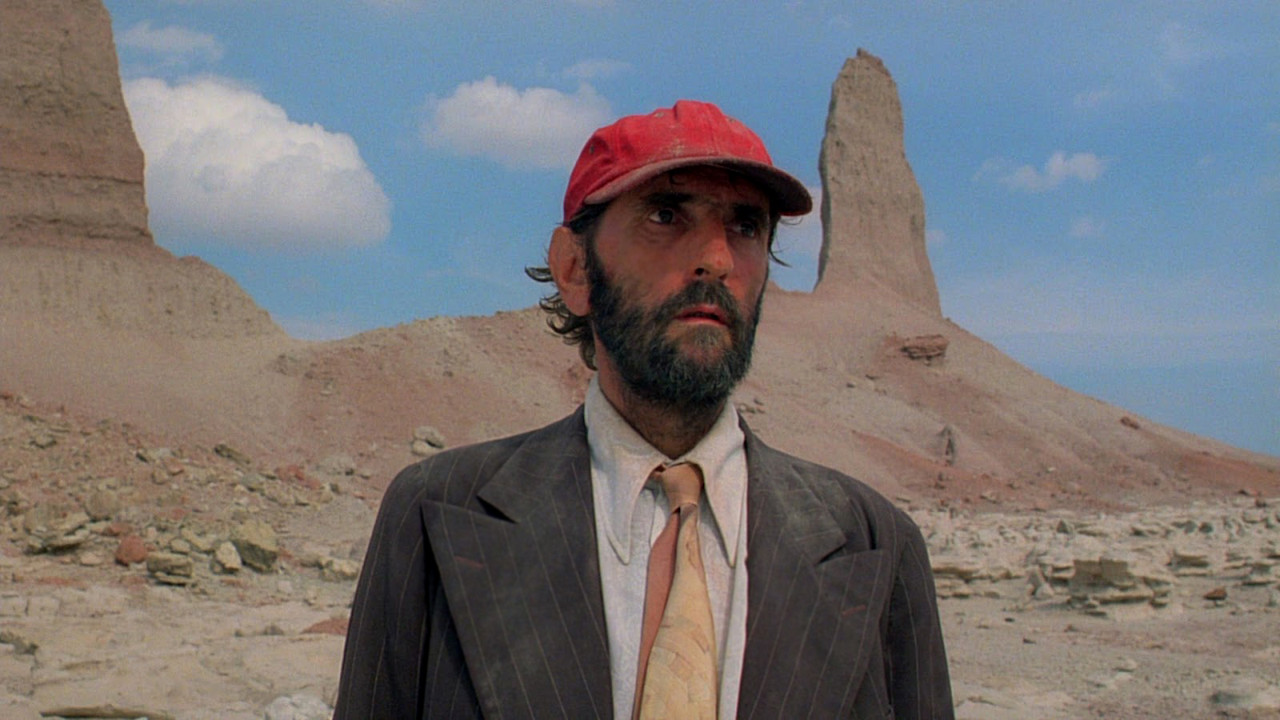
Travis (Harry Dean Stanton) wandering the desert. DP: Robby Müller.
A film that I wish would have won the Academy Award for Best Picture in honour of the 94th Academy Awards (2022).
– gas station sign
“I want to remain an enigma forever. To others, and also to myself.”Ludwig (Luchino Visconti, 1973)
Mar
25
Elton John – 1947
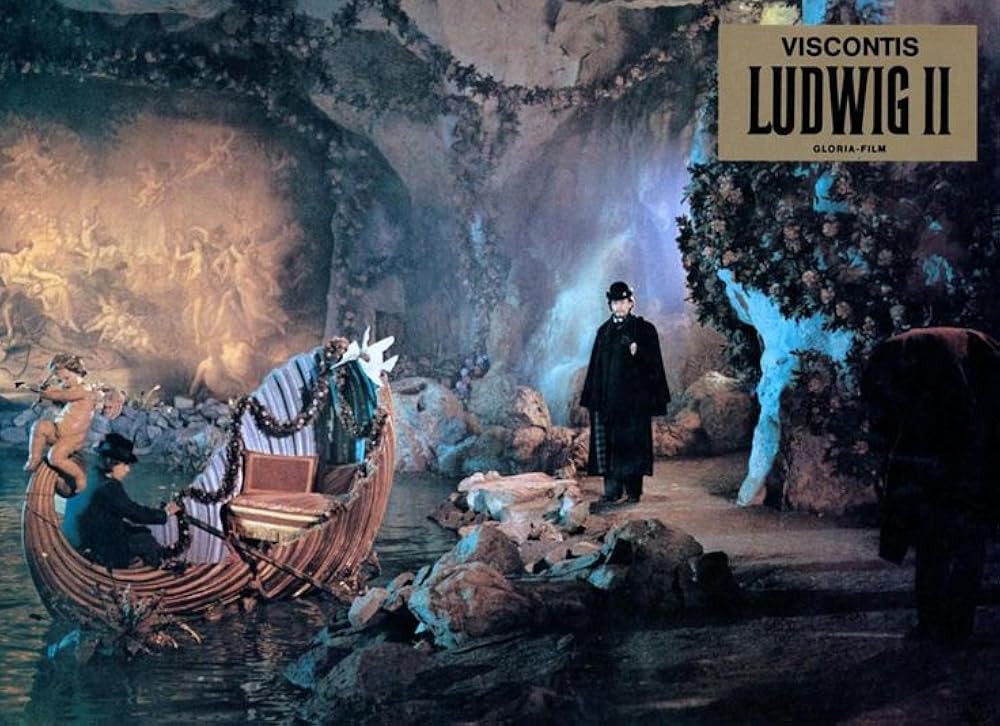
Elisabeth “Sissi” of Austria (Romy Schneider) and King Ludwig II of Bavaria (Helmut Berger) in his beloved Venus Grotto below Schloss Linderhoff. Ludwig wanted blue light in reference to the Grotta Azzurra in #Capri, and had electricity installed in the grotto, which was the first usage of electricity in Austria. DP: Armando Nannuzzi.
A flamboyant character for Elton John’s birthday (1947).
– Ludwig II
Eine mysteriöse EPIDEMIE ist ausgebrochen.Grauzone [Zones] (Fredi M. Murer, 1979)
Mar
21
1976
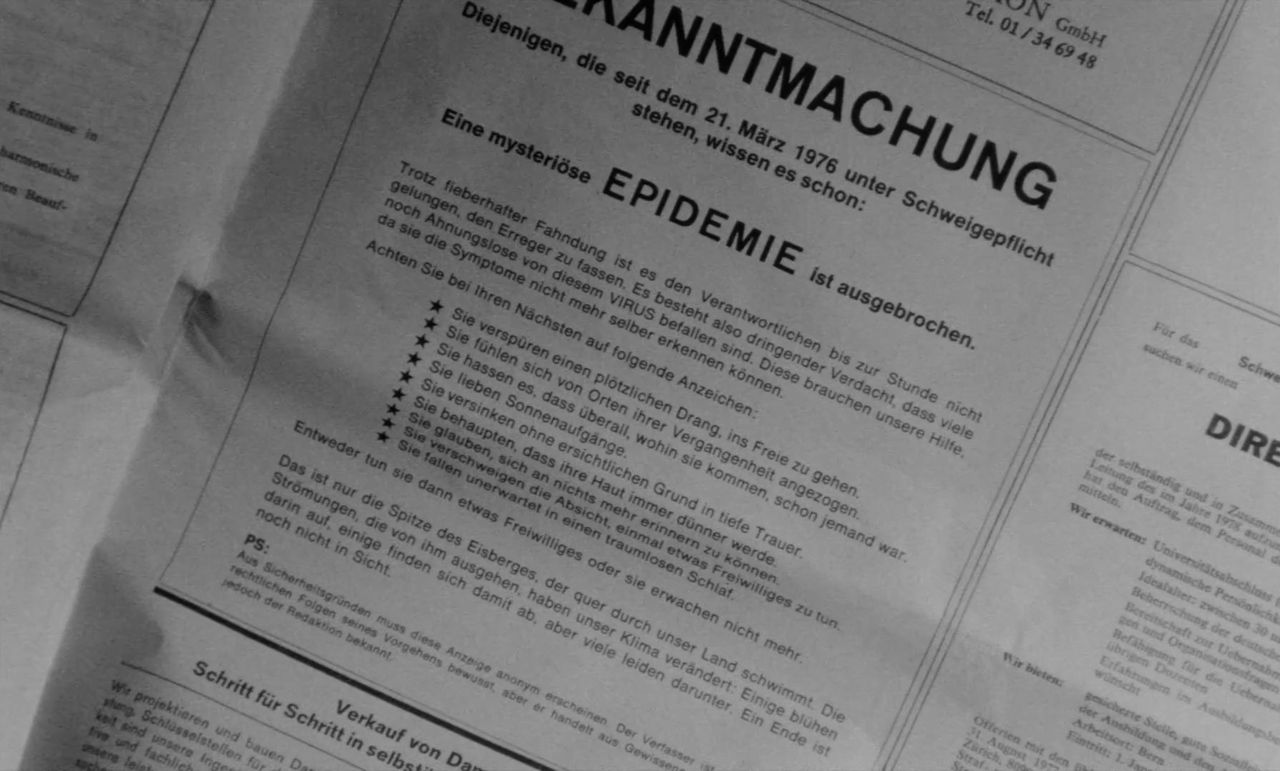
The anonymous, urgent newspaper announcement referencing the oath of secrecy considering a mysterious epidemic, starting March 21, 1976. It lists all the symptoms. DP: Hans Liechti.
Die große Ekstase des Bildschnitzers Steiner [The Great Ecstasy of Woodcarver Steiner] (Werner Herzog, 1974)
Mar
13

Walter Steiner, flying. DP: Jörg Schmidt-Reitwein.
Fata/Morgana [Left-Handed Fate / Panik 75] (Vicente Aranda, 1966)
Mar
9
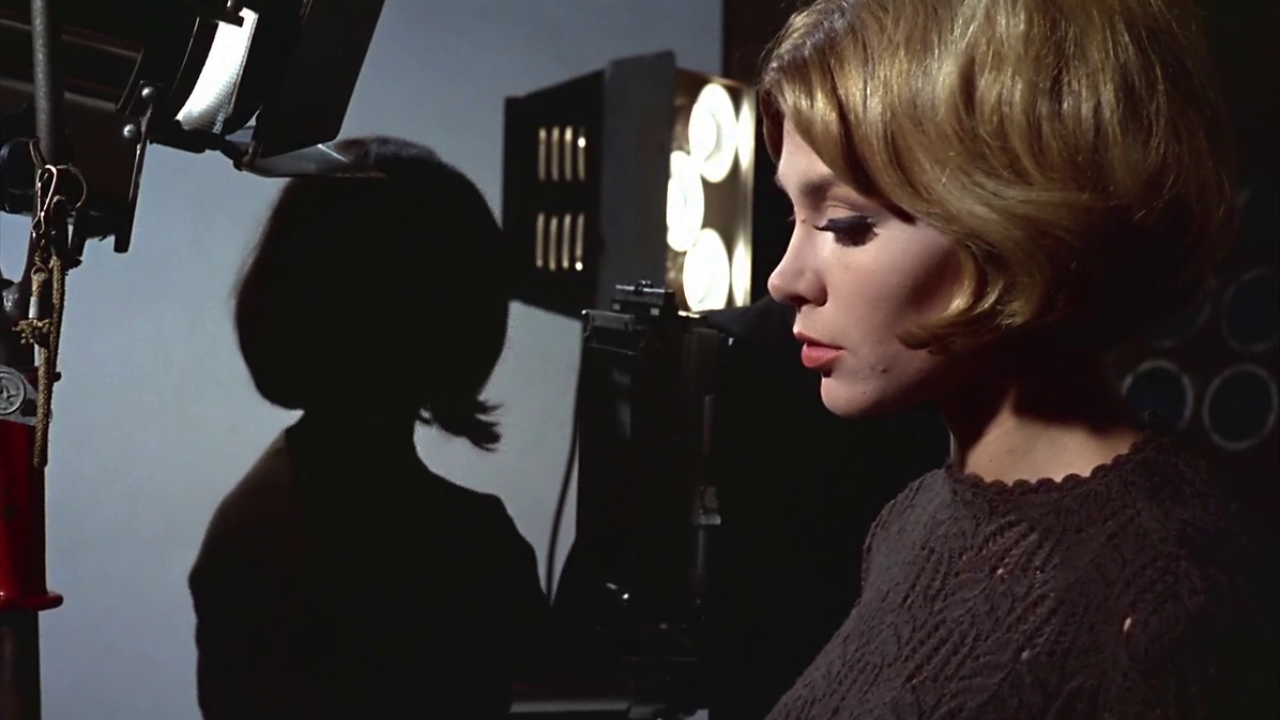
Gim (Teresa Gimpera) modelling in a photo studio. The photographer, another woman in silhouette, has an identical hairstyle and outfit. DP: Aurelio G. Larraya.
“She's always happy. She desires nothing, envies no one, is curious about nothing. You can't surprise her. She doesn't notice the humiliations, though they happen to her every day. It all rolls off her back like some waterproof material. Zero ambition. No moral code. Not even a whore's love of money.” Io la conoscevo bene [I Knew Her Well] (Antonio Pietrangeli, 1965)
Mar
5
Crispus Attucks – 1770
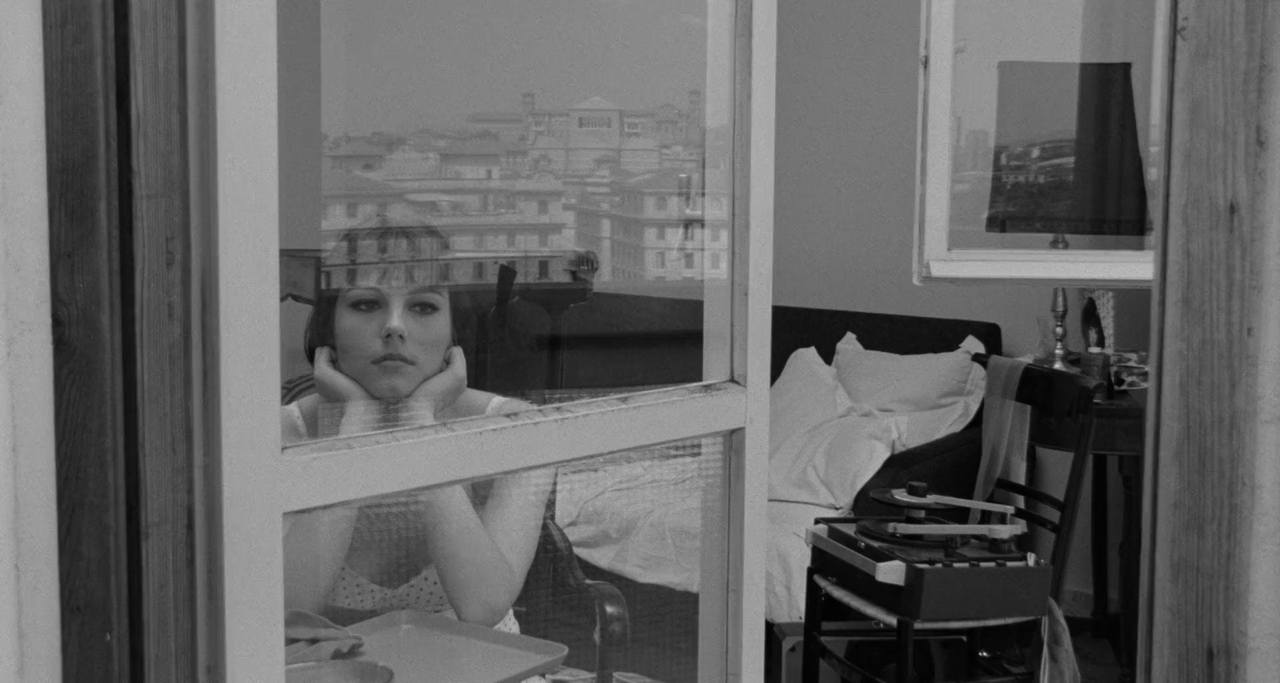
Adriana (Stefania Sandrelli) seen through her apartment window. Rome is reflected in her face. DP: Armando Nannuzzi.
A wasteful act: Crispus Attucks, (arguably) the first American victim in the American Revolution, dies on March 5th, 1770.
– The Writer
An ambitious but aimless girl – she wants to be loved, and to be a model, a proto-Edie – mills about her day.
Sublimely shot, we see Adriana through glass panes, in reflections, in an off-focal plane, in other people's words.
Der große Verhau [The Big Mess] (Alexander Kluge, 1971)
Feb
19
Copernicus born
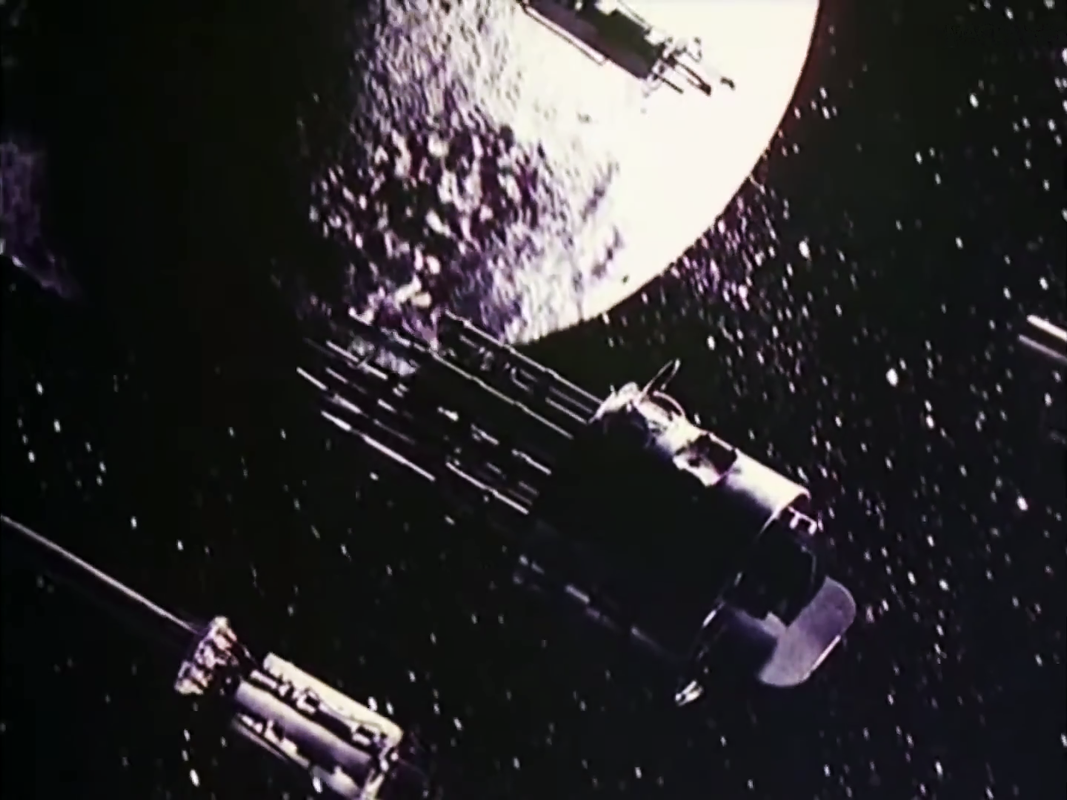
Space ships made out of all sorts of junk pass a moon. DPs: Thomas Mauch & Alfred Tichawsky.
A film about outer space for Nicolaus Copernicus' birthday (1473).
In a galaxy far far away, the opening scroll informs us, a civil war rages between governments, greedy conglomerates, and rebels. Only a few scrap-dealing space pirates can save the day!